Question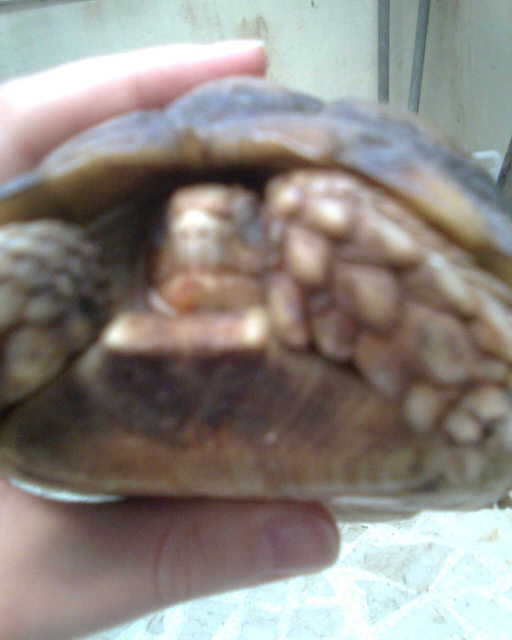 tortoise
tortoise
QUESTION: hi im a 23 year old female and i have a tortoise i dont know the type thats my problem, i had it for about 10 years. My tortoise has woken in March and always wanting to walk around but was not eating so i gave a chance cause i thought that it was still waking up but now that we are June almost July it sill not eating.It has almost all the time closed eyes but not always. her left back foot is swollen and its causing her to walk only on her hands and other back leg. I gave her to drink under a very low pressure tap she opens her mouth but still not enough intake. Once while giving her water she longed her head out and sort of vomited ( lots of bubbly saliva from her mouth) Im worried today i took her to the vet he gave her an injection contained a pink fluid half in her inner front left hand and the rest in her other inner right hand.When i asked for vitamins since she is not eating he said that the injection had some. he also stated that it was almost to late cause of dehydration and it was without energy. just to have a pic of how she lives we have a yard with tiles no soil. she walks all day in and at night i leave her to sleep in a box. she is used now to the metiod. the reasons why inside during night because one had one and found her dead probably bitten by a street small lizard common in Malta. i m worried cause i read micks blog twards a 16 yearold female and he said that vitamins could kill her and that might had respirotory infection. I dont wish to intrude with my vets work cause not to be rude since he is qualified more than me but still am worried.thankyou in advance for your concern hope to hear soon
ANSWER: Hi,
I could probably identify the tortoise from a photo (one that shows the entire tortoise, and is clear, rather than blurry).
Is your tortoise housed outdoors, where it has access to natural sunlight?
What do you feed it?
It sounds like your tortoise has an infected foot, and a respiratory infection is also a strong possibility. A tortoise that is not completely healthy going into hibernation can easily catch infections. Bad temperatures during hibernation can cause problems as well.
A dehydrated tortoise should be rehydrated before being treated, of course. Antibiotics should be given for the infections. If your tortoise has been housed indoors without UVB lighting, or has not been fed an appropriate diet, it may have hypocalcemia as well. Different tortoise species have different diets--some eat mainly broadleaf plants (like mustard greens, collards, and escarole--never lettuce or cabbage), while others eat mainly grasses. Most tortoises are strict herbivores, and should not be given animal protein. (There are a few species that are omnivorous).
I'm not sure what to make of your comment about a tortoise being bitten by a lizard. The only dangerous venomous lizards in the world are in the US southwest, and the Komodo islands. A bite from a lizard might become infected, but it's very difficult to imagine why a lizard would bite a tortoise. I suppose a large monitor lizard might try to eat one. Is there a myth that a local lizard is venomous?
Don't give vitamins to an animal that is not eating, unless they have been diagnosed with hypovitaminosis (a deficiency disease of some kind). Then, you give only the vitamin or mineral that they are lacking, and you give it along with nutritional support (tube-feeding). Dehydrated animals cannot process nutrients properly, and it could damage their kidneys.
Soak her in warm water for 20 minutes once per day. It should be shallow enough that it doesn't cover her nose when her head is tucked in and she's lying on her belly. This will help to rehydrate her. Hydration is crucial for a sick animal, particularly one with any type of infection.
Reptiles that are sick will usually not eat. However, reptiles can often go for long periods of time without food, so in most cases, the animal can be treated for their illness, and they will then begin eating again on their own, before they lose a crucial amount of weight. Worrying about nutrition is something that should be done after the illness is diagnosed and successfully treated, and the tortoise's body condition should be evaluated by an expert to determine whether tube-feeding is necessary to provide calories.
If you believe your local vet treats mainly cats and dogs, and does not have the specialized knowledge necessary to treat reptiles, try contacting a Zoo, and see if you can get in touch with one of their staff veterinarians, or if their vet can make a recommendation. This used to be a very common issue in the US...in the past decade, more US vets who are knowledgeable about reptiles are available. Even today, there are still some vets who have less knowledge than a reptile breeder, but will try to treat reptiles anyhow!
Your tortoise must be kept at the correct temperatures for its species, and kept hydrated, to have a chance of recovery. I do agree with your vet on one thing; if the animal is badly dehydrated and very lethargic, its illness may be too advanced to save it. Reptiles tend to hide signs of illness until they are on death's door, so it's important to get them treatment immediately if anything is out of the ordinary. Frequently, the first sign of a problem is a reduced appetite.
---------- FOLLOW-UP ----------
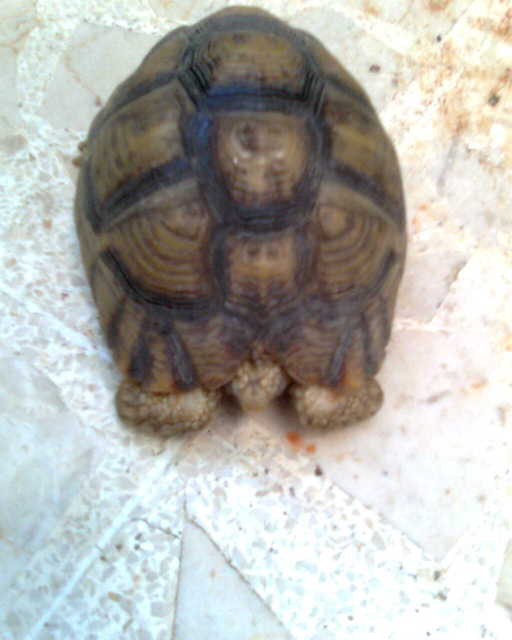 tortoise
tortoise
QUESTION: hi again first of all thx for your reply.
I uploaded another photo hope its better.
i took her to my local vet and as soon as i showed her to him, by sight he said that its dehydrated and needed a week injections and it was too late. i asked him about her foot he gave me nothing not even a cream and said nothing.
when i asked what the injection consisted he said vitamins and for dehydration. to be honest i dont know if he is giving antibiotics.
In Malta i dont believe they know about them and we dont have a zoo, not that i know off.
after two days of injection she was still the same opened her eyes and walked like always but not eating and loss of energy (when i grab her she doesnt respond to my touch like she used too).
So today i didnt go to inject her again, because if he's giving her vitamins he could kill her and he doesnt know her diagnose. he never mentioned those diagnoses you stated. when my father told his assistance about respirotory infection she told him yes it might be the problem and yes the vitamins could kill her, but as soon as he entered and she told him he said nothing and ordered this time three injections two in front hands and one back leg.
Please i beg you help me. tell me step by step what shall i do, in malta certain stuff dont have for sure. is there some natural herbs or human creams that i can use apart from warm water.
For her infection in the leg can i rub some fucidin cream? or some pills that i can dlute with water? Maybe panadols or solpadin?
At night im letting her sleep in a small box in the kithcen to be indoors maybe feel the heat better,good right?
Today in the afternoon i mashed some watermelon added bit of water cause it has its own natural water and put it in a syringe that the vet gave me. i tried opening her mouh with a bit of force and she took it but all the time she kept refusing it and pulling my hand away with her hands.
What food can i prepare for her or shall i leave her since shes not wanting to eat?
please i dont want to other you in any way i just i dont know what to do and i really wish to save her i had it for about 12years and i nevr had these problems. i dont kno anything so if you can help me please i appriciate it alot. thankyou
AnswerI want to state first that I am not qualified to give veterinary advice, but it sounds like maybe your vet isn't, either. :P So, I will do the best I can to tell you what folks here have done to aid recovery from infections, and rehydrate a sick animal. Antibiotics are still the most crucial treatment for infections.
First, continue the daily warm water soaks--they are vitally important. Tortoises have the ability to absorb water through their cloaca, so even if she isn't drinking, she will get some benefit from the soaks.
Don't attempt to force-feed her, this is very stressful, and if she is dehydrated, digesting food will stress her system more.
I failed to identify her species...she could be a mediterranean tortoise, or perhaps a very small African Spur-Thigh (I'd need to see the back legs). I'm not a tortoise keeper, I have general information on them. (I keep snakes and lizards--reptile care all has many similarities, and I have done research on several tortoise species). Those species are grass eaters, however. She does have some pyramiding of her scutes, suggesting her diet has been a bit too high in protein. At the moment of course, the goal is to get her to survive...her diet is something to worry about after she's eating again.
If you have access to a vaporizer or a nebulizer, placing her in a plastic box and giving her a nebulizer treatment once a day (warm mist) could be quite beneficial. Ask the vet if he has any nebulizer solution meant to deliver an antibiotic. (My vet had this, but your vet may not have access to it).
Keep her temperatures around 29.5 cesius, with a basking spot around 32 C.
If the vet is giving fluids by injection, that's not too bad, but I would request he not give her vitamins.
There's nothing topical to put on her foot, unless you see an actual wound there. If there is a wound, clean it with betadine, and use a little antibiotic ointment (the kind that does not have painkiller in it).



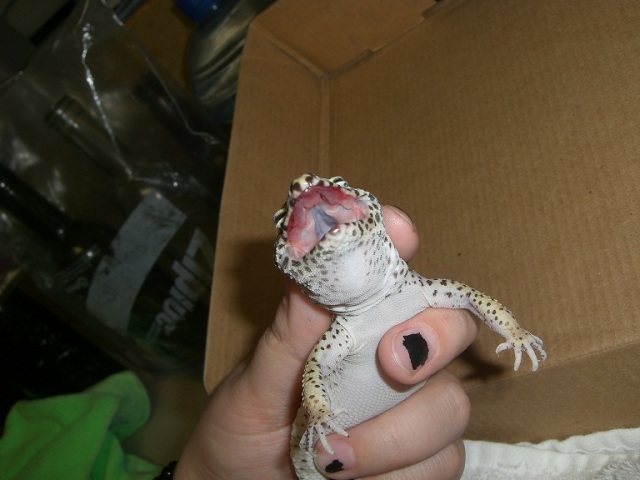 Mouth Rot
Question
Scratchs mouth
Hi there, I sent a question you
Mouth Rot
Question
Scratchs mouth
Hi there, I sent a question you
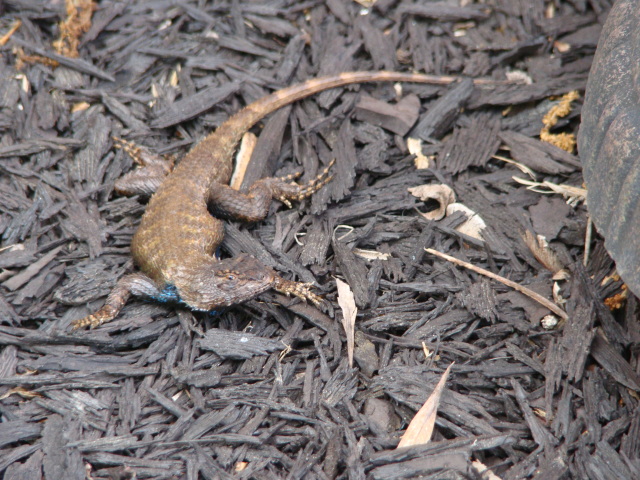 Identify lizard
QuestionUnknown lizard
QUESTION: I live in centr
Identify lizard
QuestionUnknown lizard
QUESTION: I live in centr
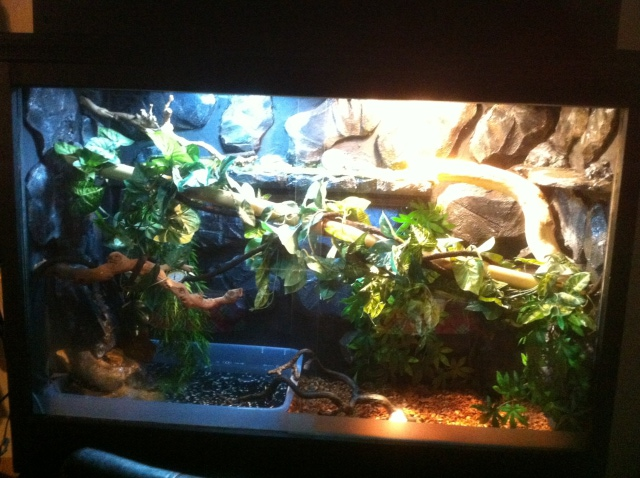 aggressive water dragon
QuestionQUESTION: Hello Tracie,
i have a Chinese water
aggressive water dragon
QuestionQUESTION: Hello Tracie,
i have a Chinese water
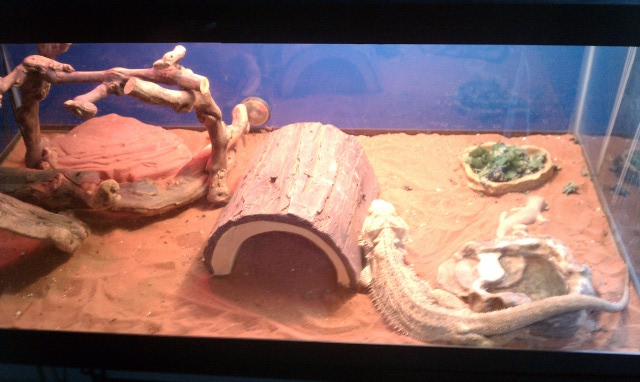 my bearded dragon wont move or eat
QuestionQUESTION: Hello my bearded dragon kiwi is 8 yea
my bearded dragon wont move or eat
QuestionQUESTION: Hello my bearded dragon kiwi is 8 yea
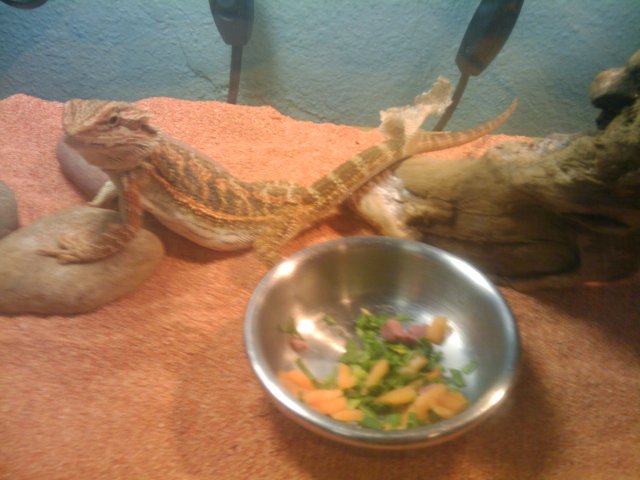 Bearded dragon not eating veggies/is it possible to potty train him?
Question
Ace a week ago
Hi Tracie
I have a male bearde
Bearded dragon not eating veggies/is it possible to potty train him?
Question
Ace a week ago
Hi Tracie
I have a male bearde